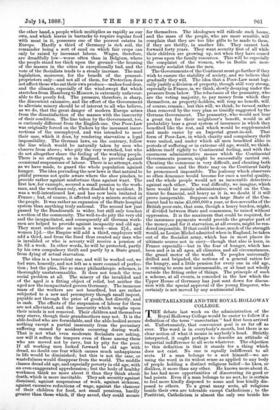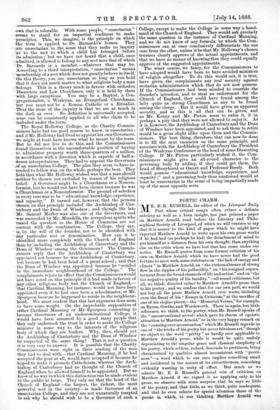lTNSECTARIANISM AND THE ROYAL HOLLOWAY COLLEGE.
THE debate last week on the administration of the Royal Holloway College would be easier to follow if a definition of the term " unsectarian " had first been arrived. at. Unfortunately, that convenient goal is as far off as ever. The word is in everybody's mouth, but there is no clear notion of what it means in anybody's head. Strictly interpreted, it ought perhaps to describe an attitude of" impartial indifference to all sects whatever. The objection to this definition is that it stands for a thing which does not exist. No one is equally indifferent to all sects. If a man belongs to a sect himself—we are using the word in its widest sense as applied to any body of people holding a distinct religious belief—he likes, or dislikes, it more than any other. He knows more about it,. he has had more opportunities of discovering its good or bad points. Even if a man belongs to no sect, he is certain to feel more kindly disposed to some and less kindly dis- posed to others. To a great many sects, all religions beside their own are tolerable except Catholicism ; to the Positivist, Catholicism is almost the only one beside his. own that is tolerable. With some people, " unsectarian " seems to stand for an impartial readiness to make proselytes. This, we imagine, is the principle on which the term is applied to Dr. Barnardo's homes. They .are unsectarian in the sense that they make no inquiry as to the sect to which a child has belonged before its admission ; but we have not heard that a child, once admitted, is allowed to belong to any sect save that of which Dr. Barnardo is a member,—whatever that may be.
According to a third interpretation, " unsectarian " means • membership of a sect which does not greatly believe in itself.
• On this theory, you are unsectarian so long as you hold that it does not much matter to what religious body a man - belongs. This is a theory much in favour with orthodox Dissenters and Low Churchmen, only it is held by them -with large exceptions. You may be a Baptist, a Con- gregationalist, a Wesleyan, an Evangelical Churchman, but you must not be a Roman Catholic or a Ritualist. Thus the issue of the inquiry is that we are as much in 'the dark as ever. No definition is universally accepted, none can be consistently applied to all who claim to be included under the term.
The Royal Holloway College, as the Charity Commis- sioners have but too good reason to know, is unsectarian ; and if Mr. Holloway had lived to appoint his own Governors, -we might at least have known what he meant by the term. But he did not live to do this, and the Commissioners found themselves in the uncomfortable position of having • to administer property worth three-quarters of a million, in accordance with a direction which is capable of half-a- dozen interpretations. They had to appoint the Governors • 'of an unsectarian College. The plan they seem to have in- tended to follow was, on the whole, perhaps the best. They held that what Mr. Holloway wished was that a man should ,neither be chosen nor excluded by reason of his religious belief. A Governor might be a Churchman or a Noncon- formist, but he would not have been chosen because he was 'a Churchman or a Nonconformist. The ground of selection in every case was to be "educational knowledge, experience, 'and capacity." It turned out, however, that the persons :chosen on this principle included the Archbishop of Can- terbury and the Dean of Windsor ; and though the late Mr. Samuel Morley was also one of the Governors, and vas succeeded by Mr. Mundella, the scrupulous spirits who • raised the question in the House of Commons are not content with the combination. The College, they say, is, by the will of the founder, not to be identified with any particular sect or denomination. How can it be identified more completely with the Church of England than by including the Archbishop of Canterbury and the Dean of Windsor- among the Governors ? The Commis- sioners reply that the Archbishop of Canterbury was appointed not because he was Archbishop of Canterbury, but because he had been head of a great school ; and that • the Dean of Windsor was appointed because he "resided in the immediate neighbourhood of the College." The complainants rejoin in effect thatthe Commissioners would 'not have acted on this principle if it had made in favour of any other religious body but the Church of England,— that Cardinal Manning, for instance, would not have been appointed even if he had once been a schoolmaster, or Mr. Spurgeon because he happened to reside in the neighbour- hood. We must confess that this last argument does seem to have some weight. On the improbable supposition of either Cardinal Manning or Mr. Spurgeon consenting to become Governors of an undenominational College, it would have been assumed by a good many people that they only undertook the trust in order to make the College minister in some way to the interests of the religious body of which they are leaders. Why, then, should not the Archbishop of Canterbury and the Dean of Windsor be suspected of the same thing? That is not a question it is very easy to answer. It is possible that the Charity Commissioners were right in their reading of the men They had to deal with,—that Cardinal Manning, if he had accepted the post at all, would have aceepted it because he hoped to make it promote Catholicism, whereas the Arch- bishop of Canterbury had no thought of the Church of England when he allowed himself to be appointed. But we • know of no way in which this distinction can be made evident to the public at large. They only see that the head of the Church of England—the largest, the richest, the most powerful sect in the country—is made Governor of an unsectarian College, and they are not unnaturally tempted to ask why he should wish to be a Governor of such a College, except to make the College in some way a hand- maid of the Church of England. They would ask precisely the same question in the instance of Cardinal Manning, and we do not know of any formula by which the Com- missioners can at once conclusively differentiate the one case from the other, unless it be that Mr. Holloway's chosen trustees dearly approve of the actual appointments, and that we have no means of knowing that they could equally approve of the suggested appointments. The wiser course, we fancy, for the Commissioners to have adopted would have been to have avoided ministers of religion altogether. To do this would not, it is true, have given the complainants any real security against sectarian administration which they do not now possess. If the Commissioners had been minded to override the founder's intention, and to steal an endowment for the Church of England, they could have found among the laity quite as strong Churchmen as any to be found among the clergy. But it would have given an apparent security, and as this is all that can be given, and as Mr. Kenny and Mr. Picton seem to value it, it is, perhaps, a pity that they were not allowed to enjoy it. As it is, however, the Archbishop of Canterbury and the Dean of Windsor have been appointed, and to ask them to retire would be a gross slight alike upon them and the Commis- sioners. The best thing, therefore, that can now be done is to fill the next vacancies on the same principle, and associate with the Archbishop of Canterbury the President of the Wesleyan Conference or the head of some Dissenting College. If Mr. Picton particularly wished it, the Com- missioners might give an all-round character to the governing body by adding, if they could get them, the head of Stonyhurst or Oscott and Professor Beesly. Both would possess "educational knowledge, experience, and capacity ;" and a governing body thus reinforced would at least be unsectarian in the sense of being impartially made up of the most opposite sects.



































 Previous page
Previous page